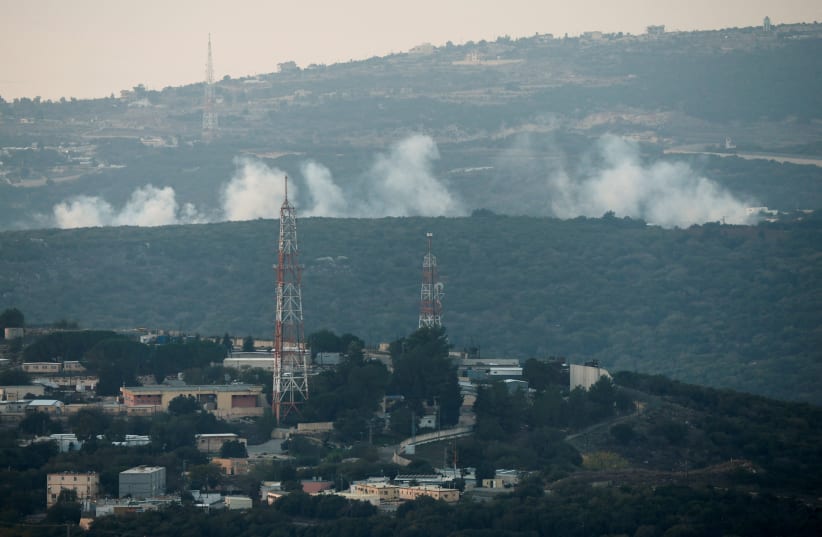Metulah, Israel’s northernmost city, which abuts the border with Lebanon, was desolate last Thursday morning due to barrages of deadly rocket fire. Some might find this news extremely discouraging, but it’s important to know what’s happening behind the scenes. Just last week, the city authorized the construction of a new neighborhood with dozens of housing units.
The photo here shows the representative of the Jewish community in Mexico (far left) which is investing in this project, next to architect Yitzchak Shapira, as well as the local counsel’s engineer and chairman of the planning commission. Final approval for the project will be given at the next meeting of the planning commission.
In the words of the prophet Jeremiah: “For so says the Lord of Hosts, the God of Israel; Houses and fields and vineyards shall be purchased again in this land.”
Holy moments
This past Shabbat morning, there was a brit milah for the son of Yedidya Eliyahu, who fell in Gaza four months ago. No words can describe the atmosphere in the event hall: a mix of joy and sorrow, a new life and one that was missing, heaven and earth, this world and the next.
The grandfather, Rabbi Yoram Eliyahu, served as sandak, the one who holds the baby during the brit. In the father’s absence, he recited the blessing: “Who sanctified us with His commandments and commanded us to enter him into the Covenant of Avraham our father.” Meitar, the mother, blessed “Sh’hechiyanu” and “Hagomel” over the brit and the safe delivery. The mohel asked those assembled to pray. “These are holy moments,” he remarked. When there are no words to express what we feel, our prayers pierce the heavens — prayers for the baby, for his mother, for the soldiers and the wounded and the hostages, prayers for everyone and everything.
And his name in Israel shall be called: Porat Avia.
I previously wrote that in reply to the question, “How are you?” Yedidya Eliyahu would reply, “Living the dream.” As I was leaving, Ziva Eliyahu, his mother, told me with eyes full of tears but with a smile: “We will continue to live the dream, only differently.”
When the newest news Is the oldest
The Israel Antiquities Authority last week reported a rare find: a coin dating from the Bar Kochva revolt and bearing the inscription “One year since Israel’s redemption” (see photo). Both sides of the coin feature the name “Elazar HaKohen,” which according to some researchers refers to Rabbi Elazar HaModa’i, believed to be Bar Kochva’s uncle.
What we find in the ground here in Israel reminds us how deep our roots are and how ancient our story is in this land.
Let’s contemplate for a moment the words of Rabbi Elazar from the Mishnah: “One who profanes consecrated sacrificial animals; one who degrades the festivals; one who humiliates his friend in public; one who abrogates the covenant of our father Abraham; or one who interprets the Torah contrary to its true intent—although he may possess Torah knowledge and good deeds, he has no share in the World to Come.”
Notice that everything here relates to respect or honor: honoring the Temple service and the holidays, honoring friends and others, honoring the practice of brit milah, and honoring the Torah. The verbs used convey lack of respect: profanes, degrades, humiliates, abrogates . . . Such an attitude distances us from eternal life and the World to Come.
This coin may be 2,000 years old, but the cautionary message of the one whose name appears on the coin is still pertinent today.
Have you heard of David Magerman?
David, a highly successful businessman and philanthropist, was one of the first donors to announce that he would cease supporting the University of Pennsylvania. Following the shocking hearing before Congress in which UPenn president Liz Magill couldn’t bring herself to condemn calls for Jewish genocide on her campus, David decided to withdraw his support from the university (which is also his alma mater). Furthermore, he called on all other self-respecting Jewish donors to follow his lead. It takes great courage to sound a voice of such moral clarity in our confused world of today. Notably, Liz Magill has since resigned from her post.
At the end of February, we both participated in a panel discussion at the annual Project Inspire Convention in Connecticut. There, David described a second brave step that he took.
Like so many of our brothers and sisters in the diaspora, he did not receive a Jewish education. “I was a “twice-a-year Jew — on Yom Kippur and Pesach,” he explained, “but Judaism didn’t mean anything to me. I completed my doctorate and achieved great financial success. One day, I received an invitation from my relative in Israel to come to his son’s bar mitzvah. That was how, several years ago, I found myself on Shabbat in the Har Nof neighborhood of Jerusalem. And I fell in love. In contrast to the isolated existence that so many people live today, there, I saw a community coming together to celebrate with a bar mitzvah boy, and it was pure joy. I met little children who knew much more Torah than I did. The experience moved me greatly. After I returned to the US, I arranged a study partner and started to learn Torah. My life was transformed. My children are now learning in a Jewish day school.
And then came his third brave move. In front of 1,000 people at the Project Inspire Shabbaton, David made a dramatic announcement:
“The time has come for us to make Aliyah. I’ve already purchased a home in Israel. I didn’t merit to have my children born there, but I do hope that my grandchildren will. This is the direction our history is headed and it is the right place to be. Not only because of antisemitism but because it is our home.”

